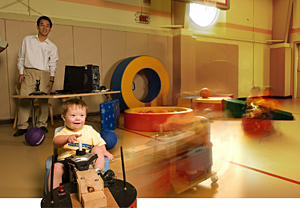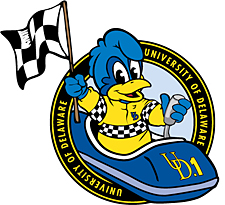
- Rozovsky wins prestigious NSF Early Career Award
- UD students meet alumni, experience 'closing bell' at NYSE
- Newark Police seek assistance in identifying suspects in robbery
- Rivlin says bipartisan budget action, stronger budget rules key to reversing debt
- Stink bugs shouldn't pose problem until late summer
- Gao to honor Placido Domingo in Washington performance
- Adopt-A-Highway project keeps Lewes road clean
- WVUD's Radiothon fundraiser runs April 1-10
- W.D. Snodgrass Symposium to honor Pulitzer winner
- New guide helps cancer patients manage symptoms
- UD in the News, March 25, 2011
- For the Record, March 25, 2011
- Public opinion expert discusses world views of U.S. in Global Agenda series
- Congressional delegation, dean laud Center for Community Research and Service program
- Center for Political Communication sets symposium on politics, entertainment
- Students work to raise funds, awareness of domestic violence
- Equestrian team wins regional championship in Western riding
- Markell, Harker stress importance of agriculture to Delaware's economy
- Carol A. Ammon MBA Case Competition winners announced
- Prof presents blood-clotting studies at Gordon Research Conference
- Sexual Assault Awareness Month events, programs announced
- Stay connected with Sea Grant, CEOE e-newsletter
- A message to UD regarding the tragedy in Japan
- More News >>
- March 31-May 14: REP stages Neil Simon's 'The Good Doctor'
- April 2: Newark plans annual 'wine and dine'
- April 5: Expert perspective on U.S. health care
- April 5: Comedian Ace Guillen to visit Scrounge
- April 6, May 4: School of Nursing sponsors research lecture series
- April 6-May 4: Confucius Institute presents Chinese Film Series on Wednesdays
- April 6: IPCC's Pachauri to discuss sustainable development in DENIN Dialogue Series
- April 7: 'WVUDstock' radiothon concert announced
- April 8: English Language Institute presents 'Arts in Translation'
- April 9: Green and Healthy Living Expo planned at The Bob
- April 9: Center for Political Communication to host Onion editor
- April 10: Alumni Easter Egg-stravaganza planned
- April 11: CDS session to focus on visual assistive technologies
- April 12: T.J. Stiles to speak at UDLA annual dinner
- April 15, 16: Annual UD push lawnmower tune-up scheduled
- April 15, 16: Master Players series presents iMusic 4, China Magpie
- April 15, 16: Delaware Symphony, UD chorus to perform Mahler work
- April 18: Former NFL Coach Bill Cowher featured in UD Speaks
- April 21-24: Sesame Street Live brings Elmo and friends to The Bob
- April 30: Save the date for Ag Day 2011 at UD
- April 30: Symposium to consider 'Frontiers at the Chemistry-Biology Interface'
- April 30-May 1: Relay for Life set at Delaware Field House
- May 4: Delaware Membrane Protein Symposium announced
- May 5: Northwestern University's Leon Keer to deliver Kerr lecture
- May 7: Women's volleyball team to host second annual Spring Fling
- Through May 3: SPPA announces speakers for 10th annual lecture series
- Through May 4: Global Agenda sees U.S. through others' eyes; World Bank president to speak
- Through May 4: 'Research on Race, Ethnicity, Culture' topic of series
- Through May 9: Black American Studies announces lecture series
- Through May 11: 'Challenges in Jewish Culture' lecture series announced
- Through May 11: Area Studies research featured in speaker series
- Through June 5: 'Andy Warhol: Behind the Camera' on view in Old College Gallery
- Through July 15: 'Bodyscapes' on view at Mechanical Hall Gallery
- More What's Happening >>
- UD calendar >>
- Middle States evaluation team on campus April 5
- Phipps named HR Liaison of the Quarter
- Senior wins iPad for participating in assessment study
- April 19: Procurement Services schedules information sessions
- UD Bookstore announces spring break hours
- HealthyU Wellness Program encourages employees to 'Step into Spring'
- April 8-29: Faculty roundtable series considers student engagement
- GRE is changing; learn more at April 15 info session
- April 30: UD Evening with Blue Rocks set for employees
- Morris Library to be open 24/7 during final exams
- More Campus FYI >>
4:07 p.m., Oct. 7, 2008----A University of Delaware research team that uses robotics to provide infants with independent mobility, thus enhancing their mobility and development, has been awarded a two-year, $324,910 National Science Foundation grant to expand its work.
The project is being led by principal investigator James C. (Cole) Galloway, associate professor of physical therapy, and co-principal investigator Sunil Agrawal, professor of mechanical engineering.
Currently, infants who cannot walk due to severe brain, muscle and/or bone disorders must wait until they are three years of age, if not much older, before a power wheelchair is available to them. The research team hopes to make mobility available at a much younger age.
Galloway said infant development emerges from the child's ongoing interactive exploration of the surrounding world. By the first year, independent mobility typically emerges and infants use crawling and walking to explore distant locations. Given the thousands of social and physical interactions that mobile infants enjoy per week, he said, it is not surprising that mobility is linked to widespread advances in cognitive development and learning abilities in typically developing infants.
It is important to consider the magnitude of limitations on exploration and interaction that infants with mobility impairments experience during each day as they wait years to begin power mobility training, Galloway said, adding that the deep impact of this chronic immobility early in an infant's life is a physical and emotional challenge for these infants and their families.
“To be honest,” Galloway said, “this has become an emotional issue for the members of our research team, as well. We are each now part advocate and part clinical scientist.”
Previous work by the research team with a joystick-driven, robot-enhanced mobility device suggests that young infants may have the learning ability and motivation to drive months before they walk. To date, the researchers have been studying the effect of early driving training on infants with and without developmental disabilities in partnership with UD's Early Learning Center.
In the new NSF-funded project, the team will focus on further advancing the robotics technology as guided by how infants learn to drive. This specific project will track infants' navigation skills and general development as they are trained to drive the mobile robot, which is designed to aid their learning, maintain their safety and record their driving performance.
This project will also advance the design of developmentally inspired robotics, and provide guideposts for the design and construction of robots that effectively interact with young children, Agrawal said. As with previous studies, the infants are as much a part of the team as they are “subjects.”
As a part of this new NSF funding, the group plans to develop two mobile robots, one for indoor mobility training and the second for outdoor mobility training, said Agrawal. These robots will be integrated with sensors to map the environment, hardware to record the movement of the robot, and a novel force-reflecting joystick for directional training of the movement.
Galloway said the NSF-funded project will pave the way for a clinical trial of the effects of providing special needs infants with safe, fun and effective mobility for real world exploration within the first year of life.
Educationally, the project will foster creative collaborations between students of engineering and child development. Furthermore, the interaction of robots and infants will be used as a model to expose students of various ages to the fun, excitement and satisfaction of science and engineering, he said.
Specific activities include robotics design classes, including a campuswide design contest, a short course for high school teachers, a seminar for childcare providers, Webcast seminars in rehabilitation robotics, and a video on developmentally inspired robotics. A focus will be on exposing under-represented groups to the discovery of science.
The researchers note that they are in need of both undergraduate researchers and families interested in having their infants participate in the research. Currently, both typically developing infants and infants born with mobility limitations, such as those diagnosed with spina bifida and cerebral palsy, may qualify for participation. All families are encouraged to contact the research team, however infants between six months and one year are currently of most interest, Galloway said.
Interested families and students should contact Galloway at (302) 831-3697 or via e-mail at [jacgallo@udel.edu], or Agrawal at (302) 831-8049 or [agrawal@udel.edu].
Article by Neil Thomas
Photo by Kathy Atkinson



